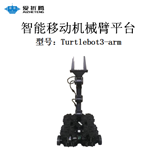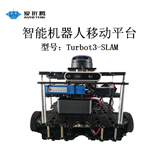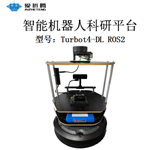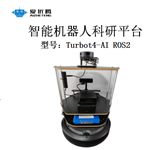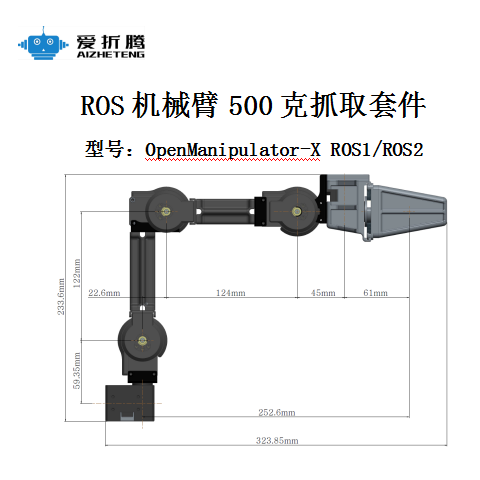Turbot与python编程-实现线速度标定
Turbot与python教程-实现线速度标定
说明:
- 介绍如何实现通过python控制turbot实现线速度标定
- 针对Turtelbot1或非Turtelbot2机器人做校准参考
代码:
- 参考代码:github
- 实现代码:
import rospy
from geometry_msgs.msg import Twist, Point
from math import copysign, sqrt, pow
from dynamic_reconfigure.server import Server
import dynamic_reconfigure.client
from turbot_code.cfg import CalibrateLinearConfig
import tf
class CalibrateLinear():
def __init__(self):
# Give the node a name
rospy.init_node('calibrate_linear', anonymous=False)
# Set rospy to execute a shutdown function when terminating the script
rospy.on_shutdown(self.shutdown)
# How fast will we check the odometry values?
self.rate = rospy.get_param('~rate', 20)
r = rospy.Rate(self.rate)
# Set the distance to travel
self.test_distance = rospy.get_param('~test_distance', 1.0) # meters
self.speed = rospy.get_param('~speed', 0.15) # meters per second
self.tolerance = rospy.get_param('~tolerance', 0.01) # meters
self.odom_linear_scale_correction = rospy.get_param('~odom_linear_scale_correction', 1.0)
self.start_test = rospy.get_param('~start_test', True)
# Publisher to control the robot's speed
self.cmd_vel = rospy.Publisher('/cmd_vel', Twist, queue_size=5)
# Fire up the dynamic_reconfigure server
dyn_server = Server(CalibrateLinearConfig, self.dynamic_reconfigure_callback)
# Connect to the dynamic_reconfigure server
dyn_client = dynamic_reconfigure.client.Client("calibrate_linear", timeout=60)
# The base frame is base_footprint for the TurtleBot but base_link for Pi Robot
self.base_frame = rospy.get_param('~base_frame', '/base_link')
# The odom frame is usually just /odom
self.odom_frame = rospy.get_param('~odom_frame', '/odom')
# Initialize the tf listener
self.tf_listener = tf.TransformListener()
# Give tf some time to fill its buffer
rospy.sleep(2)
# Make sure we see the odom and base frames
self.tf_listener.waitForTransform(self.odom_frame, self.base_frame, rospy.Time(), rospy.Duration(60.0))
rospy.loginfo("Bring up rqt_reconfigure to control the test.")
self.position = Point()
# Get the starting position from the tf transform between the odom and base frames
self.position = self.get_position()
x_start = self.position.x
y_start = self.position.y
move_cmd = Twist()
while not rospy.is_shutdown():
# Stop the robot by default
move_cmd = Twist()
if self.start_test:
# Get the current position from the tf transform between the odom and base frames
self.position = self.get_position()
# Compute the Euclidean distance from the target point
distance = sqrt(pow((self.position.x - x_start), 2) +
pow((self.position.y - y_start), 2))
# Correct the estimated distance by the correction factor
distance *= self.odom_linear_scale_correction
# How close are we?
error = distance - self.test_distance
# Are we close enough?
if not self.start_test or abs(error) < self.tolerance:
self.start_test = False
params = {'start_test': False}
rospy.loginfo(params)
dyn_client.update_configuration(params)
else:
# If not, move in the appropriate direction
move_cmd.linear.x = copysign(self.speed, -1 * error)
else:
self.position = self.get_position()
x_start = self.position.x
y_start = self.position.y
self.cmd_vel.publish(move_cmd)
r.sleep()
# Stop the robot
self.cmd_vel.publish(Twist())
def dynamic_reconfigure_callback(self, config, level):
self.test_distance = config['test_distance']
self.speed = config['speed']
self.tolerance = config['tolerance']
self.odom_linear_scale_correction = config['odom_linear_scale_correction']
self.start_test = config['start_test']
return config
def get_position(self):
# Get the current transform between the odom and base frames
try:
(trans, rot) = self.tf_listener.lookupTransform(self.odom_frame, self.base_frame, rospy.Time(0))
except (tf.Exception, tf.ConnectivityException, tf.LookupException):
rospy.loginfo("TF Exception")
return
return Point(*trans)
def shutdown(self):
# Always stop the robot when shutting down the node
rospy.loginfo("Stopping the robot...")
self.cmd_vel.publish(Twist())
rospy.sleep(1)
if __name__ == '__main__':
try:
CalibrateLinear()
rospy.spin()
except:
rospy.loginfo("Calibration terminated.")
整合指南:
- 请参考rbx1的indigo版本的校准部分及rbx1_nav包
- 增加cfg的配置文件
- 修改CMakelists.txt 增加dynamic_reconfigure部分
- 修改package.xml 增加dynamic_reconfigure部分
演示:
- 主机,新终端,启动底盘
$ roslaunch turbot_bringup minimal.launch
- 从机,新终端,启动校准脚本
$ rosrun turbot_code calibrateLinear.py
- 从机,新终端,启动动态参数窗口
$ rosrun rqt_reconfigure rqt_reconfigure
勾选start_test,机器人开始前行1米
确定偏移值的步骤:
- 测量和记录每次直行的实际距离
- 计算X比率=实际距离/目标距离
- 进入rqt_reconfigure界面,修改odom_linear_scal_correction值,新值=X*原值。
- 重新测试,勾上start_test
- 继续重复测试,直到符合理想状态,1米距离误差在1cm内都属于正常范围
应用偏移值步骤:
- 修改turtlebot.launch
<param name="turtlebot_node/odom_linear_scal_correction" value="X" />
修改X为获取的值
如果是非Turtlebot机器人
- 修改ticks_meter(每米编码器脉冲值), 新值=ticks_meter旧值/odom_linear_scale_correction
获取最新文章: 扫一扫右上角的二维码加入“创客智造”公众号




